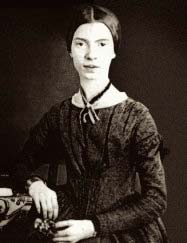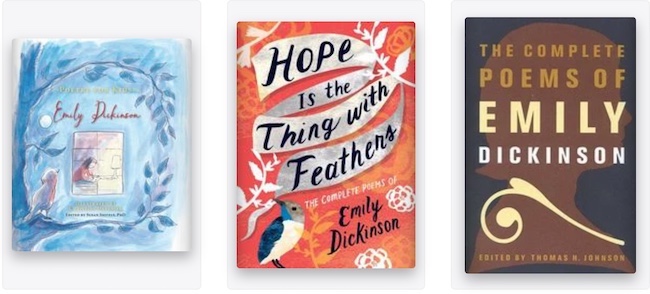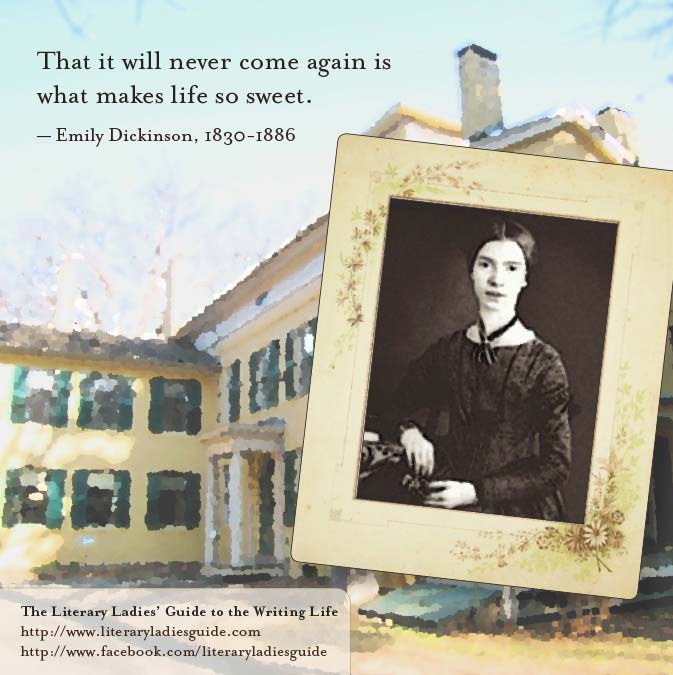10 Well-Loved Poems by Emily Dickinson
By Nava Atlas | On December 28, 2014 | Updated September 13, 2022 | Comments (5)

Emily Dickinson (1830 – 1886) wrote more than 1,700 poems, only a handful of which were published during her lifetime. Here we’ll look at 10 of her best-loved poems.
Dickinson remains something of a mystery, which fuels the continued fascination with her work and life. In The Penguin Companion to American Literature (1971), Eric Mottram offered this assessment of her poetic practices:
“She hoarded her poems, among them love poems, apparently addressed to Benjamin Newton, a student in her father’s office, with whom she corresponded until his death in 1853, and Charles Wadsworth, a distinguished married clergyman who may have left America because of her.
‘Pardon my sanity in a world insane,’ she wrote in a letter, a clue to her need to create a balanced life out of her passion and intellectual clarity.
In 1863 she probably wrote about 140 poems, and in 1864 nearly 200, the high point of her prolific output of about 1,775 poems, all written within the characteristic late 19th-century range of relationships between God, man, and nature.
Since she did not have the pressures of publication, her style is remarkably free, intense, and idiosyncratic, the exact form of her complex personality.
“Tell all the Truth but tell it slant —” one of her famous lines, suggests that the truths revealed in her poetic works are as individual as the person who reads them.
After Emily Dickinson’s death at age 55, a trove of her poetry was discovered by her younger sister Lavinia. But it wasn’t until the twentieth century that she was given her due as one of the pre-eminent American poets.
Poems included in this post:
- “Hope” is the thing with feathers
- Because I could not stop for death
- I dreaded that first Robin
- If I should die
- We grow accustomed to the Dark
- While we were fearing it, it came—
- Why do I love You, Sir?
- I had no time to hate, because
- If you were coming in the fall
- I’m Nobody! Who are you?
. . . . . . . . .
“Hope” is the thing with feathers
“Hope” is the thing with feathers —
That perches in the soul —
And sings the tune without the words —
And never stops — at all —
And sweetest — in the Gale — is heard —
And sore must be the storm —
That could abash the little Bird
That kept so many warm —
I’ve heard it in the chillest land —
And on the strangest Sea —
Yet — never — in Extremity,
It asked a crumb — of me.
. . . . . . . . . . .
Because I could not stop for death
Because I could not stop for Death—
He kindly stopped for me—
The Carriage held but just Ourselves—
And Immortality. We slowly drove—He knew no haste
And I had put away
My labor and my leisure too,
For His Civility—
We passed the School, where Children strove
At Recess—in the Ring—
We passed the Fields of Gazing Grain—
We passed the Setting Sun—
Or rather—He passed us—
The Dews drew quivering and chill—
For only Gossamer, my Gown—
My Tippet—only Tulle—
We paused before a House that seemed
A Swelling of the Ground—
The Roof was scarcely visible—
The Cornice—in the Ground—
Since then—’tis Centuries—and yet
Feels shorter than the Day
I first surmised the Horses’ Heads
Were toward Eternity—
. . . . . . . . . .

. . . . . . . . . .
I dreaded that first Robin
I dreaded that first Robin, so,
But He is mastered, now,
I’m some accustomed to Him grown,
He hurts a little, though—
I thought if I could only live
Till that first Shout got by—
Not all Pianos in the Woods
Had power to mangle me—
I dared not meet the Daffodils—
For fear their Yellow Gown
Would pierce me with a fashion
So foreign to my own—
I wished the Grass would hurry—
So—when ’twas time to see—
He’d be too tall, the tallest one
Could stretch—to look at me—
I could not bear the Bees should come,
I wished they’d stay away
In those dim countries where they go,
What word had they, for me?
They’re here, though; not a creature failed—
No Blossom stayed away
In gentle deference to me—
The Queen of Calvary—
Each one salutes me, as he goes,
And I, my childish Plumes,
Lift, in bereaved acknowledgement
Of their unthinking Drums—
. . . . . . . . . . .
If I should die
If I should die,
And you should live—
And time should gurgle on—
And morn should beam—
And noon should burn—
As it has usual done—
If Birds should build as early
And Bees as bustling go—
One might depart at option
From enterprise below!
’Tis sweet to know that stocks will stand
When we with Daisies lie—
That Commerce will continue—
And Trades as briskly fly—
It makes the parting tranquil
And keeps the soul serene—
That gentlemen so sprightly
Conduct the pleasing scene!
. . . . . . . . . . .
We grow accustomed to the Dark
We grow accustomed to the Dark—
When light is put away—
As when the Neighbor holds the Lamp
To witness her Goodbye—A Moment—We uncertain step
For newness of the night—
Then—fit our Vision to the Dark—
And meet the Road—erect—And so of larger—Darkness—
Those Evenings of the Brain—
When not a Moon disclose a sign—
Or Star—come out—within—
The Bravest—grope a little—
And sometimes hit a Tree
Directly in the Forehead—
But as they learn to see—
Either the Darkness alters—
Or something in the sight
Adjusts itself to Midnight—
And Life steps almost straight.
. . . . . . . . . . .

Emily Dickinson’s Poetic Quotes
. . . . . . . . . . .
While we were fearing it, it came—
While we were fearing it, it came—
But came with less of fear
Because that fearing it so long
Had almost made it fair—There is a Fitting—a Dismay—
A Fitting—a Despair
’Tis harder knowing it is Due
Than knowing it is Here.They Trying on the Utmost
The Morning it is new
Is Terribler than wearing it
A whole existence through.
. . . . . . . . . . .
Why do I love You, Sir?
“Why do I love” You, Sir?
Because—
The Wind does not require the Grass
To answer—Wherefore when He pass
She cannot keep Her place.
Because He knows—and
Do not You—
And We know not—
Enough for Us
The Wisdom it be so—
The Lightning—never asked an Eye
Wherefore it shut—when He was by—
Because He knows it cannot speak—
And reasons not contained—
—Of Talk—
There be—preferred by Daintier Folk—
The Sunrise—Sire—compelleth Me—
Because He’s Sunrise—and I see—
Therefore—Then—
I love Thee—
. . . . . . . . . . .
I had no time to hate, because
I had no time to hate, because
The grave would hinder me,
And life was not so ample I
Could finish enmity.
Nor had I time to love, but since
Some industry must be,
The little toil of love, I thought,
Was large enough for me.
. . . . . . . . . . .
If you were coming in the fall
If you were coming in the fall,,
I’d brush the summer by
With half a smile and half a spum,
As housewives do a fly.
If I could see you in a year,
I’d wind the months in balls,
And put them each in separate drawers,
Until their time befalls.
If only centuries delayed,
I’d count them on my hand,
Subtracting till my fingers dropped
Into Van Diemen’s land.
If certain, when this life was out,
That yours and mine should be,
I’d toss it yonder like a rind,
And taste eternity.
But now, all ignorant of the length
Of time’s uncertain wing,
It goads me, like the goblin bee,
That will not state its sting.
. . . . . . . . . . .
I’m Nobody! Who are you?
I’m Nobody! Who are you?
Are you—Nobody—Too?
Then there’s a pair of us!
Don’t tell! they’d advertise—you know!
How dreary—to be—Somebody!
How public—like a Frog—
To tell one’s name—the livelong June—
To an admiring Bog!
. . . . . . . . . . .

A Quiet Passion: Reviews of the Film
… you have put a mark on the time… it flies with it… and when it stops.. your mark learnt enough… it will keep flying… till the sky halts somewhere if at all…
Bye bye. See you again someday.
It’s sad to be the last one so
Let me be the first.
You liked the brown eyes lazy Susan’s and
they are in full bloom now so I know you are still with me. Thanks for being so visible
As always,. you are so kind to keep me company. through the night and to wake me up with the morning light.
I hadn’t read any of these poems before, and enjoyed reading them.
I always find that poetry written by many ladies in Victorian times, is dark, and quite often refers to death.
I guess it was the world they lived in, as most people did not live to a great age.
None-the-less, I love this style of poetry, which holds a lot of depth, with the meaning of life/death.
Thank you for posting. I very much enjoy your page .. Rosemary
FOR ROSEMARY SMITH
^^^^^^^^^^^^^^^^^^^^^^^^
May I thank you for Emily
Since she is occupied
Or I by her, her simile
Filled with unseemly pride
Since near familiarity
With death was her conceit
Perhaps she grants me parity
That you and she might meet?
^^^^^^^^^^^^^^^^^^^^^^^^
What a lovely thought to share, thanks!